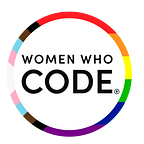dotJS 2017 | Women Who Code
Follow Gemma Cagney on Twitter and her Website.
My name is Gemma, I’m a web dev based in Dublin with a penchant for DIY electronics projects. I’ve been a member of WWCode for about 2yrs. Recently I attended dotJS in Paris on the 1st Dec as a beneficiary of their amazing Fellows program and in collaboration with WWCode. At the end of the event, the dotJS team proudly informed us that more people than any previous year had attended on Fellows tickets and personally I’m so grateful for the opportunity.
The emphasis on diversity and inclusion was evident, accessibility was a major theme across multiple talks. In his talk about The Future of Web Testing Trent Willis (@trentmwillis) of Netflix said testing helps us build confidence in the software we develop. It’s not enough for apps to merely work, they have to deliver a good user experience which goes beyond functionality. According to him, software needs to be accessible, performative and necessary. I’d like to explore what I saw under these headings.
Accessibility
The day was split into three sessions, the first one of the day delivered one of my favourite talks from programmer and hardware hacker Suz Hinton (@noopkat). Suz draws commonalities between seemingly unrelated topics and used art theory to discuss programming; I think she and I hail from the same side of the nerdiverse. When I attend conferences I’m hoping to see an inspirational talk like this. A great speaker who can maintain multiple strands of inquiry and deliver her thoughts with clarity, she covered programming, art, machine learning, guerilla accessibility and the campaign for a more thoughtful wheelchair icon.
[Suz Hinton (left) being lovely and talking to the author after her session]
Describing hacking as “making use of the space between the written rules and the actual rules”, Feross Aboukhadijeh (@feross) followed Suz in delivering what can only be described as an anti-accessibility talk. Feross took the audience on a journey of revenge on spammers as he live coded the most annoying website ever. Feross actually does a lot of good with his work for open source projects, but his blog posts about hacking the quirks of web development and exposing his findings to educate others are not to be missed.
During the final session of the day Marcy Sutton (@marcysutton) gave a thoughtful talk on accessibility and common mistakes we make that are failing and isolating our users. She’s so passionate about her work as an advocate and her work with axe-core/axe-coconut (an accessibility library which was given a shoutout by Trent in his talk) that I couldn’t help feeling inspired to try be better in my own code as standard rather than as a second thought.
[Feross Aboukhadijeh and his insane ‘Annoying Site’, an anti-spammer destination]
Performative
Naturally, JS guru Wes Bos’s (@wesbos) talk on Async/Await set the conference off on a running start. As someone who initially felt very bamboozled by Promises in JS, I personally am a big fan of this bit of syntactic sugar. But I work with people who think it’s unecessary and that’s cool, we can have differing opinions and nerdy JS duels. Sean Larkin (@TheLarkInn) noted that you can use ‘async’ in your <script /> tags to load your JS asynchronously, which is pretty neat! During the lightening talks, TypeScript got a little shout out which I’m happy about because I think it’s awesome. One speaker informed us that GraphQL (which I’ve heard elsewhere, but perhaps it’s a long way off yet) will replace the Rest APIs because as a protocol its inherently flawed and beyond fixing.
Trent Willis made some interesting points about code coverage: how it can feel great to get a print out in the terminal saying all the code is covered by tests but does that really matter if your product is full of code that a user never uses? That made me stop and think. Co-creator of the Django project Adrian Holovaty (@adrianholovaty) gave a very interesting talk about why frameworks might not always be optimal. Adrian drew on his personal experience of maintaining Django and as such had a pretty well-informed opinion on opinionated frameworks. He advised that using patterns over frameworks can make production more lightweight. See his browser-based app soundslice for proof and a really cool way to learn how to play music.
Necessary
I want to keep this article as more of an overview, so I’m going to interpret ‘necessary’ as the next advancements coming down the JS pipeline that excited the speakers, advancements they feel are well needed. Partially because I think there’s a lot of overlap between performative and a more literal understanding of necessary code in production and partially because looking forwards is a really good way to finish an article about a lot of people in a room celebrating JS and eating pastries.
MC Christophe Portneuve (@porteneuve) for the evening did a great job of asking speakers what future features they felt excited about. Additionally, the founder of JS Brendan Eich closed the event with a charming historic overview and some information about what TC39 are working on. Here’s some things he and the other speakers mentioned: observables, async iteration, CSS grid, GraphQL, Puppeteer, Machine Learning, Patreon and implications for full-time Open Source work, service workers, offline apps, Web USB to Browser connections, WebGL, BigInt, types, dynamic imports and peer-to-peer browsers.
[Christophe Portneuve and Brendan Eich in a post talk discussion]
Originally published at www.womenwhocode.com.
